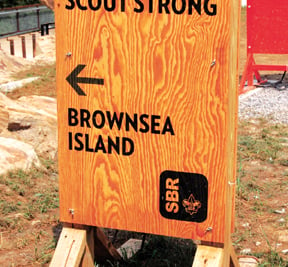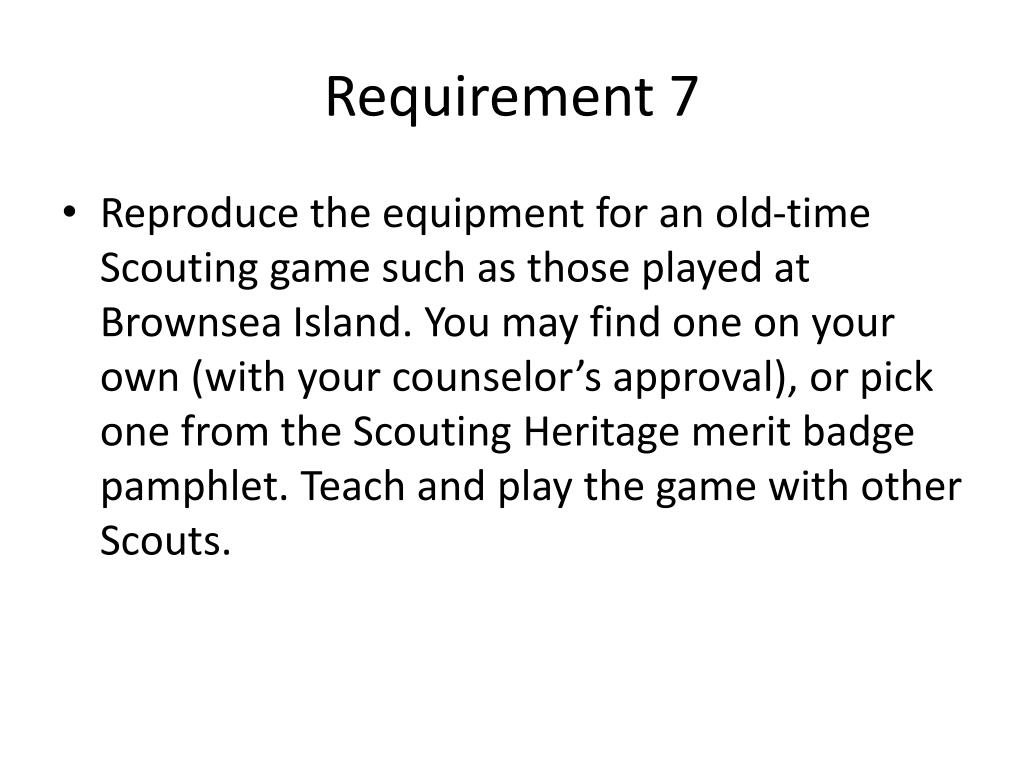MILESTONES to Scouting was originally chosen as the title for this series of articles to demonstrate that there was no single event that can claim to be the starting point for Scouting. It must be remembered that the Brownsea participants were not Scouts in the true sense of the word - they had not taken the Law and the Promise.Some did go on to become Scouts, but others did not join when eventually the opportunity was presented, preferring to remain in the Boys' Brigade or their School's Cadet Corps. All of the original participants that left any sort of written record seem to agree that what happened on Brownsea was very special and stayed with them throughout out their lives.
- Old Time Scouting Games Played At Brownsea Island Ferry
- Scouting Heritage Merit Badge And Worksheet
- Games Played At Brownsea Island - Evernano
Baden-Powell was 50 years old in 1907. He had achieved world-wide fame as 'The Hero of Mafeking'. He had toured Britain extensively and spoken to a wide range of audiences about his ideas of using Army Scout training to motivate what he saw as disaffected youth. He had involved other youth organisations - notably the YMCA and the Boys' Brigade. He had a populist publisher waiting for the drafts of his latest book, which was a revision, designed especially to appeal to the young, of his army manual Aids to Scouting. He had the support of the great and the good throughout the land. What he did not have was practical experience in working with young people! True, his ideas had worked on Army Scouts. The Mafeking Cadets were, in the main, much younger and though inspirational were not trained by Baden-Powell. As far as boys of 'scout age' were concerned, B-P only had the word of others, young and old alike, that his ideas would work. Now he needed to find out for himself.
Organisation
- Reproduce the equipment for an old-time Scouting game such as those played at Brownsea Island. You may find one on your own (with your counselor's approval), or pick one from the Scouting Heritage merit badge pamphlet. Teach and play the game with other Scouts. Find an interesting game, learn the rules, and make the equipment that is required.
- Dec 05, 2013 Here’s a guest post featuring four great rediscovered games for Scouts from Enoch Heise. Enoch’s blog Scouting Rediscovered should be on your reading list. Enoch has loads of enthusiasm and practical information on getting to the heart of Scouting from the perspective of a young (18 years old) Eagle Scout.

DURING a fishing holiday in May 1907 at Knocklofty in Ireland, B-P had met Mr and Mrs Charles van Raalte. They got on very well and invited B-P to visit them in their London home or at their castle on the 500-acre Brownsea Island in Poole Harbour, Dorset.
Reproduce the equipment for an old-time Scouting game such as those played at Brownsea Island. You may find one on your own (with your counselor's approval), or pick one from the Scouting Heritage merit badge pamphlet. Teach and play the game with other Scouts. There is a complete Scouting History of the island from 1907 to the present day including the Brownsea Sunrise Ceremony. The book concludes with an appeal on behalf of the Brownsea Scout and Guide Management Committee with whose support the book was written. The work has been acclaimed as being definitive and having unparalleled research.
As a boy, B-P had sailed in Poole Harbour with his brothers and made illegal landings on Brownsea Island's private beaches. It seemed to him to be the ideal place to conduct his experimental camp. On his return to London, B-P wrote asking for permission, and was sent back van Raalte's recently-published little booklet about Brownsea. Yes it had everything he needed, particularly isolation. He wrote,
'I was anxious to get away from outsiders, press reporters and other 'vermin', where I could try out the experiment without interruption.'
SOME press reporters must have become aware of the camp, because B-P replied to the Editor of The Daily Mirror from Brownsea on August 4th, 1907, on Brownsea Camp headed stationary (see later image). B-P insisted that the camp was a 'small experimental one' and in no way worth publicity at that stage. He skilfully manipulated the situation by promising full co-operation when 'the scheme' was in its complete form. I am sure that the Editor of The Daily Mirror understood by this that no such 'co-operation' would be forthcoming had he dared go against B-P's wishes and report on the Brownsea 'experiment'.
Baden-Powell invited some of his army chums to send their sons, but right from the start he was clear that Scouting was to be for all boys, not just a privileged minority. In Edwardian Britain this was a revolution in its own right. As far as education was concerned, youngsters from the different classes were well segregated. On Brownsea there were ten of 'town boys' and eleven were the children of his friends who were mainly at (fee-paying) public schools. To make this social mix a reality a 'sliding scale' of fees was charged, the 'town boys' paying three shillings and six pence (17½p) whilst the public schoolboys were charged £1 per boy. Baden-Powell intended that 'the troop' be 18 strong, but found that 21 boys wanted to attend, plus one he had not expected, his nephew Donald Baden-Powell - the nine-year-old son of his late brother George.
B-P could not of course run the entire venture by himself and so he invited his life-long friend, Major Kenneth 'The Boy' McLaren to accompany him on the venture. McLaren had served with B-P in India and in South Africa. He was wounded in the relieving of Mafeking and made a prisoner-of-war. B-P wrote to him every day and, knowing that the Boers would read his letters, B-P used them to give misleading information.
The 'town boys' were to come from Boys' Brigade Companies, seven from Bournemouth and three from Poole. B-P left much of the practical details to the local Boys' Brigade in the person of Captain Henry Robson of the Bournemouth Company and instructions were coming to him from B-P in London thick and fast. In a letter to Robson, dated June 19th, 1907, B-P asks him to supply six lads (this was later to alter) and, where he can, hire bell tents with flooring for sleeping and obtain a 'contractor for feeding and cooking'. There would need to be a flag pole and several other items that caused Robson to scratch his head; B-P wanted two rowing boats, a quantity of logs and some steel-tipped harpoons with an eye in the shaft so that they could be secured by rope. Harpoons were not common in Poole, and Robson had to have them speedily-made by a local blacksmith. In the same letter, B-P declared the purpose of the camp: 'I propose to teach them' [i.e Robson's Boys' Brigade boys] 'my new form of Scouting for Boys . . .' It seems likely that this might be the first use of the term 'Scouting for Boys'.
The photograph (taken after the Brownsea Island camp in 1909) shows two of the boys selected by Captain Robson - Sgt. Herbert 'Nippy' Watts (left) and Sgt. Herbert Collingbourne (right) of the 1st Bournemouth Boys' Brigade.
The venture needed food stores and catering facilities and in this B-P was lucky. Robson's friend, Captain G W Green of the Poole Boys' Brigade, was involved in the catering business.
In 1927, Captain Robson re-visited the island with 500 Scouters on the occasion of the Bournemouth Scouting Conference. He told the delegates of the 'marooning' of the provisions for the camp and, except for 'the mercy of providence' how they very nearly found a watery grave on their way to the island the night before B-P arrived. Unfortunately, I have found no further details of these dramatic events.
After correspondence with B-P, the two BB Captains supplied the names of the ten Boys' Brigade 'town boys'. B-P had written to Captain Robson on July 19th, to say he could take eight in total. He was under the impression that some of these would be from the Church Lads' Brigade. Of his friends's children, two came from Eton, two from Harrow and and two Cheltenham, one from Elstree School Charterhouse, the two remaining boys as were at that point being tutored at home.
William Stephens, the C.O. of the Coastguard Station at Sandbanks, near Poole, was contacted and agreed to be on hand to give demonstrations to the boys in First Aid and Firefighting.
Old Time Scouting Games Played At Brownsea Island Ferry

B-P wrote letters of invitation to all the parents, they were explicit and promised ' ... wholesome food, cooking and sanitation, etc. would be carefully looked into ... ' The boys should be practised in three knots - reef, sheet bend and clove hitch - before arrival and they must be able to swim.
The camp was planned for nine days starting on Monday, August 1st, 1907, but both Baden-Powell and McLaren were on Brownsea before that, preparing for the boys' arrival, contrary to what some sources say - but the evidence is incontrovertible.
The first letter sent out from the Brownsea Island camp by B-P is shown on the right (John Ineson Collection). The postmark is '27 JY' and the letter itself clearly records the date as July 26th, 1907. The writing paper was obviously supplied by the van Raaltes. B-P wrote:
'Now I am down here preparing my Boys Camp. It is the perfect place for it - a splendid island, well-wooded and wild, giving plenty of scope for Scouting. I think we shall have a very good time if the weather is only kind, which it doesn't promise to be at the moment.'
In a subsequent letter, to a Miss Lyttelton, again written from Brownsea, dated July 28th, B-P gives an interesting insight on one of his pet hobby-horses:
'But I quite agree with you one wants to teach these boys the quality of not 'grousing' - and I think that may come as a result of such training as that of 'Scouts' - for they are not born grousing: there is hope if one catches them young enough . . . The Loafers are the grousers.'
Scouting Heritage Merit Badge And Worksheet
During the Siege of Mafeking, B-P had been disconcerted by 'grousers' and had publicly remonstrated with them, threatening financial consequences should they continue! The success of the 'anti-grousing' training at Brownsea can perhaps be best demonstrated by the comments of one of the BB lads, who wrote to him afterwards.
'The most important thing that a great many boys need to learn is to look at the bright side of things and to take everything by the smooth handle. I myself found that a great lesson . . .'

Games Played At Brownsea Island - Evernano
THE Projected Schedule for the Week, as quoted by Sir Percy Everett. Note that this must have been written in advance, as the actual camp lasted for 9 days - longer for the first arrivals.